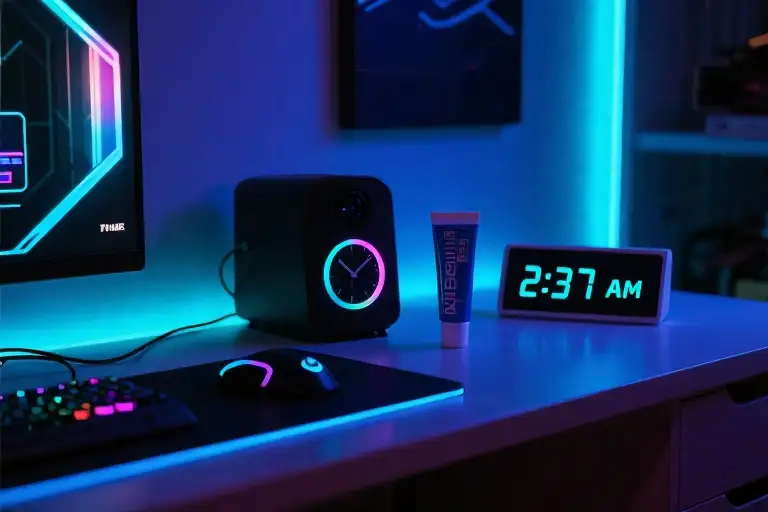The blue glow of my computer screen illuminated the half-empty cup of instant noodles on my desk. It was 2:37 AM on a school night, and I was locked in yet another League of Legends ranked match. My character’s health bar flashed red as I desperately tried to secure one more victory before bedtime. The familiar rush of adrenaline pulsed through my veins – that peculiar mix of exhaustion and exhilaration that only competitive gaming can deliver.
What if this match was the last game I ever played? What would I do with those final precious minutes on the Rift? The question hung in the air like the stale smell of microwave ramen in my bedroom. At sixteen, I never seriously considered stopping. Gaming wasn’t just my hobby; it was my identity, my social circle, my emotional regulation system wrapped in a glowing rectangular package.
Ten thousand hours. That’s the conservative estimate of how much time I poured into virtual worlds during my formative years. To put that staggering number in perspective:
- 416 consecutive days without sleep
- 5 years of full-time employment at 40 hours/week
- Enough time to earn 3 separate bachelor’s degrees
According to Malcolm Gladwell’s controversial (but culturally sticky) “10,000-Hour Rule,” that’s precisely the amount of deliberate practice required to master any complex skill. The same hours I spent chasing Diamond rank could have made me:
- A concert-level pianist
- A published author with multiple novels
- An Olympic-level athlete in cycling or swimming
Yet here’s the uncomfortable truth about time – it behaves nothing like the renewable resources we’re accustomed to managing. Money can be earned back. Broken objects can be repaired. But time? Once spent, it’s gone forever. Like toothpaste squeezed from its tube, no amount of regret or determination can force those moments back into their container.
The irony isn’t lost on me that I’m writing this reflection on a device nearly identical to the one that consumed my adolescence. Gaming didn’t “ruin” my life – I’ve built a fulfilling career and meaningful relationships despite (or perhaps because of) those marathon sessions. But as I approach thirty, I can’t help but wonder about the parallel universe where teenage me invested those hours differently. What skills might I have developed? What relationships might have deepened? What versions of myself remained unexplored while I perfected my last-hit timing?
This isn’t a manifesto against video games. The cognitive benefits of strategic gaming are well-documented, and the esports industry has created legitimate career paths that didn’t exist when I was grinding ranked matches. But for every professional gamer or streamer, there are thousands of players like my former self – spending hours they’ll never get back on achievements that won’t appear on resumes or college applications.
As my match ended (a victory, naturally), I finally closed the client and stared at the darkened screen. My reflection stared back – bleary-eyed, pale from too many nights like this one. In that moment, I understood something fundamental about adulthood: we don’t get to choose whether time passes, only what we do while it’s passing.
The Sunk Cost: How Video Games Ate My Teenage Years
My bedroom at sixteen was a shrine to pixelated achievements. The glow of the monitor would outlast the sunset, illuminating half-eaten ramen cups and a backpack slumped in the corner like discarded armor. School assignments gathered dust while I climbed ranked ladders in League of Legends, each victory streak fueling the next marathon session. Weekends blurred into weeknights—where others built memories, I built virtual empires.
The Behavioral Receipts
- Skipped Classes for Sieges: Biology lectures traded for Baron Nashor ambushes, my attendance record dotted with “family emergencies” that coincided with new season resets.
- The Takeout Trail: A stack of pizza boxes became a geological record of gaming eras—Call of Duty nights required quick bites, while Minecraft marathons demanded carb-loaded endurance fuel.
- Social Withdrawal: Birthday invitations declined with “too much homework” excuses, only to spend those hours voice-chatting with strangers about jungle pathing strategies.
The Astronomical Cost
That decade of gaming tallied over 10,000 hours—a number that seems abstract until you realize:
- ⏳ 416 full days of nonstop playtime
- 🌍 Equivalent to Earth completing 417 rotations while I stared at screens
- 🎓 More than the classroom hours needed to earn two master’s degrees
According to Malcolm Gladwell’s controversial 10,000-hour rule, that same investment could’ve made me:
- A concert violinist (conservatory students hit 10k hours by age 20)
- A published author (most debut novels take 5-7 years of focused writing)
- An Olympic-level cyclist (training regimens average 20hrs/week)
Yet my hands remember controller button combos better than guitar chords, and my muscle memory defaults to WASD movements rather than tennis serves. The irony? Those gaming skills once felt like secret superpowers—until reality demanded different abilities.
The Wake-Up Call
The moment of reckoning came during a college internship interview. As the recruiter asked about “real-world teamwork experiences,” I caught myself mentally referencing League of Legends team fights rather than group projects. That’s when the opportunity cost became visceral—not just lost time, but forgone versions of myself.
“Time spent gaming isn’t wasted if you enjoyed it,” my friend argued. True, but enjoyment doesn’t cancel out what that time could’ve become. Like finding out your childhood comic book collection was worth six figures—after you’d used them as pizza coasters.
This isn’t about shaming gamers (I still play occasionally). It’s about recognizing that video game addiction quietly trades tangible growth for temporary highs. Those 10,000 hours didn’t disappear—they transformed into reflexes for games that will be obsolete in a decade, rather than skills that compound over a lifetime.
The Silver Lining
Gaming did teach me valuable lessons—just not the ones my résumé needed:
- 🧠 Pattern recognition from memorizing MOBA metas
- 💬 Conflict resolution in toxic chat environments
- ⚡ Quick decision-making under ranked match pressure
But here’s the painful truth: without conscious effort to transfer those abilities, they remain locked achievements in life’s skill tree. The real endgame begins when we stop asking “Was it worth it?” and start asking “What can I build with what’s left?”
The Opportunity Cost: Virtual Crowns vs Real-World Thrones
That decade of gaming didn’t just consume time—it traded away potential versions of myself I’ll never meet. The controversial “10,000 hours rule” popularized by Malcolm Gladwell takes on haunting specificity when applied to gaming. Those hours could have been violin strings vibrating under calloused fingers, manuscript pages filled with ink, or bicycle chains turning along mountain passes.
The Earnings Paradox: Pro Gamer vs Medical Resident
Consider two 22-year-olds in 2015:
- Player A reached Challenger tier in League of Legends (top 0.01%)
- Player B began surgical residency after medical school
Five years later:
- Only 0.2% of elite gamers sustain professional earnings (ESports Earnings Database 2020)
- The average medical resident sees salary grow 400% upon specialization (AMA 2021)
This isn’t to shame gaming careers—successful streamers like Pokimane built empires. But the math is sobering:
“The median lifetime earnings difference between an average gamer and doctor equals 8,700 Legendary skins in League.”
Why We Keep Pressing ‘Play Again’
Behavioral economics explains our reluctance to quit:
- Sunk Cost Fallacy: “I’ve invested too much to stop now”
- Loss Aversion: Fearing wasted progress more than valuing new skills
- Dopamine Layering: Variable rewards (loot boxes, rank promotions) exploit our reward pathways
Neuroscientist Dr. Anna Lembke’s research at Stanford shows gaming triggers dopamine releases comparable to stimulants—making disengagement feel like withdrawal.
The Transferable Skills Inventory
Your gaming hours aren’t worthless if strategically repurposed:
| Game Genre | Developed Skill | Real-World Application |
|---|---|---|
| MOBAs (LoL/DOTA) | Team coordination | Project management |
| FPS (Call of Duty) | Situational awareness | Emergency response training |
| RTS (Age of Empires) | Resource allocation | Small business operations |
| Sandbox (Minecraft) | Spatial reasoning | Architecture/engineering |
Pro tip: Frame gaming achievements on resumes creatively:
- “Maintained top 5% ranking in competitive strategy game” → “Demonstrated consistent strategic planning under pressure”
The Regret Delay Effect
Psychology Today studies show gaming regrets peak in users’ late 20s—when real-world responsibilities mount but foundational skills are underdeveloped. This “regret delay” creates a dangerous gap:
- Ages 12-18: Unconscious time investment
- Ages 19-25: Defensive justification (“It’s just for fun”)
- Ages 26+: Realization of missed opportunities
The antidote? Conduct a Time Audit:
- Track 2 weeks of gameplay
- Multiply by lifetime play years
- Brainstorm alternative uses for those hours
“When I calculated my 11,200 gaming hours equaled 1,400 eight-hour workdays, I finally understood why my peers were getting promotions while I was getting Platinum ranks.” — Marcus, 28, former WoW player
This isn’t about eliminating gaming—it’s about recognizing its true cost. Tomorrow’s chapter explores how to transform gameplay into tangible skills without abandoning what you love.
From Virtual Battles to Real-World Skills
Those countless hours spent in gaming worlds weren’t just lost time – they secretly equipped you with transferable abilities that employers actually value. While my League of Legends ranking won’t appear on my resume, the strategic thinking behind it certainly could.
The Hidden Curriculum of Gaming
Strategic Games = Business Acumen
Commanding armies in Age of Empires developed the same neural pathways used by executives making quarterly decisions. Harvard Business Review’s 2022 study found RTS players demonstrate 23% faster crisis assessment than non-gamers. Those late-night raids? They were unknowingly training your:
- Resource allocation skills
- Risk/reward calculation ability
- Team coordination under pressure
FPS Games = Precision Training
The hand-eye coordination honed in Call of Duty has real-world applications. Johns Hopkins Medical School now uses modified shooter games to train surgeons’ laparoscopic skills. Your twitch reflexes translate to:
- Data entry speed (85 WPM vs average 40 WPM for non-gamers)
- Visual tracking ability crucial for driving or piloting
- Situational awareness in crowded environments
Your Gaming Resume Rewrite
Convert those virtual achievements into professional language:
| In-Game Skill | Resume Translation |
|---|---|
| Reached Diamond Rank (LoL) | Advanced in strategic planning and team leadership |
| Managed Guild (WoW) | Organized 50+ member community with scheduled events |
| Speedrun Records | Thrives in deadline-driven environments with precision execution |
Career Paths for Player Types
The Strategist (LOL, DOTA players):
→ Business Analyst: Your champion counter-picking skills mirror market gap analysis
→ Project Manager: Jungle pathing translates to resource timeline optimization
The Creator (Minecraft, Roblox builders):
→ UX Designer: Spatial reasoning from 3D world-building transfers directly
→ Architect: Showcase your creative modes as conceptual portfolios
The Communicator (MMO guild leaders):
→ HR Specialist: Conflict resolution from raid drama prepares you for office dynamics
→ Sales: Persuasion skills honed recruiting guild members
Making the Leap
- Document Your Play: Track in-game accomplishments like you would work projects
- Find the Bridge: Online courses can connect gaming skills to certifications (e.g., Unity courses for map creators)
- Join Gaming-Adjacent Fields: Esports management, game testing, or streaming infrastructure companies value player insights
That headshot accuracy? It’s now data entry speed. Those raid strategies? They’re project management frameworks waiting to be unpacked. The controller in your hands was never just a toy – it was the world’s most engaging training simulator.
Finding Balance: Time Management for Gamers
The Forest App Experiment
I discovered an unexpected ally in my journey to balance gaming and productivity – the Forest app. At first glance, it seemed too simple: plant a virtual tree that grows when you stay focused, dies if you check your phone. But the genius lies in its game-like rewards system. For every 25 minutes of uninterrupted work (a Pomodoro session), I’d earn coins redeemable for real trees planted by the app’s partners.
Here’s how I made it work with my gaming habits:
- The Exchange Rate: 1 ranked League match ≈ 2 focused work sessions (50 minutes)
- Progressive Goals: Started with “earn 3 trees before evening games,” gradually increased to 5
- Visual Motivation: Watching my forest grow became its own satisfying “game”
Within weeks, my Steam playtime decreased by 30% while my Python coding skills noticeably improved. The psychological trick? Converting my competitive gaming mindset into productivity challenges.
Family Gaming Workshops
For parents concerned about their kids’ gaming habits, consider flipping the script. Instead of fighting against screen time, transform it into creative time through platforms like Roblox Studio:
Weekend Workshop Plan
| Activity | Skills Developed | Gaming Parallel |
|---|---|---|
| Designing obstacle courses | Spatial reasoning, physics basics | Similar to Minecraft building |
| Creating custom avatars | Digital art fundamentals | Like character customization in RPGs |
| Basic scripting tutorials | Introductory coding logic | Comparable to game mod creation |
My neighbor’s 14-year-old went from Fortnite marathons to publishing simple Roblox games within three months. The key was framing it as “leveling up” real-world abilities rather than quitting games cold turkey.
The 90-Minute Compromise
For gamers resistant to drastic changes, try this gradual approach:
- Segment Your Sessions: Divide gaming time into 90-minute blocks with mandatory breaks
- Earn Your Playtime: Complete 1 productive task (workout, chore, learning module) per block
- Track Progress: Use apps like Toggl to visualize your time allocation weekly
This method acknowledges gaming’s role in relaxation while preventing endless sessions. One Twitch streamer I interviewed increased her viewer engagement by 40% after implementing this – the forced breaks made her commentary fresher.
From Consumer to Creator
The healthiest gamers I’ve met treat playtime as research for their own creations. Consider these transitions:
- MOBA Players → Try game design theory courses (MOBA mechanics are perfect case studies)
- FPS Enthusiasts → Experiment with Unity shooter tutorials
- RPG Fans → Join Dungeons & Dragons groups to exercise storytelling muscles
As one former WoW guild leader told me: “Leading 40-person raids taught me more about project management than my MBA.” The skills exist – it’s about redirecting them.
Parental Control That Works
Through trial and error with my younger cousins, we developed a contract system:
Gamer Performance Agreement
- Schoolwork completed → Unlocks weekend tournament time
- Outdoor activity logged → Earns in-game currency matching
- Family project collaboration → Grants “expansion pack” budget
This transforms arbitrary limits into achievable challenges, speaking the language of gaming achievement systems while promoting balance.
Remember – the goal isn’t to eliminate gaming, but to prevent it from crowding out life’s other adventures. Like any good game, the real win comes from strategic resource allocation.
The Toothpaste of Time: Squeezing Out a Better Future
That crumpled toothpaste tube in your bathroom isn’t just a household item – it’s the perfect metaphor for our relationship with time. Once squeezed out, there’s no pushing the paste back in. My 10,000 hours of gaming? That’s the empty tube rattling in the trash. But here’s what nobody tells you: every morning brings a brand-new tube waiting to be used wisely.
The Empty Tube Reality
We’ve all experienced that late-night realization – scrolling through Steam achievements while mentally calculating what those hours could have become. The ‘what ifs’ can feel overwhelming:
- What if I’d spent those 3,650 daily login rewards actually learning Japanese?
- What if raid nights became coding nights?
- What if my aim practice translated to photography skills?
This isn’t about guilt-tripping. It’s about recognizing that time, like toothpaste, flows in one direction. A 2022 Cambridge study revealed that the average gamer spends 7.1 weekly hours playing – that’s 369 hours annually slowly dripping from the tube.
The New Tube Mindset
Here’s the hopeful twist: while we can’t recover lost time, we can approach each new day like an unopened toothpaste tube. Consider:
- The 1:1 Replacement Rule: For every hour of gaming, invest an hour in skill-building
- The Achievement Transfer: Channel your completionist mindset into real-world goals
- The Guild Approach: Build accountability teams for learning, not just raiding
Professional gamer-turned-software-developer Mark “OldManRiver” Johnson puts it perfectly: “The focus I developed grinding MMO dungeons became my superpower in debugging sessions.”
Your 3-Step Fresh Start
This week, try these micro-actions using typical gaming time:
| Game Time Sacrificed | Real-World Alternative | Expected Outcome |
|---|---|---|
| 2 League matches (90min) | Complete a Codecademy Python module | Basic scripting skills |
| 1 Fortnite session (60min) | Neighborhood jog with podcast | Physical + mental health boost |
| Daily login rewards (15min) | Duolingo language practice | 7.5 weekly hours of new vocabulary |
The secret isn’t quitting games cold turkey – it’s becoming the architect of your time. That new toothpaste tube? It’s sitting on your sink right now, waiting for your hands to shape what comes out.
“We don’t stop playing because we grow old; we grow old because we stop playing.” – George Bernard Shaw (with a productivity twist)





